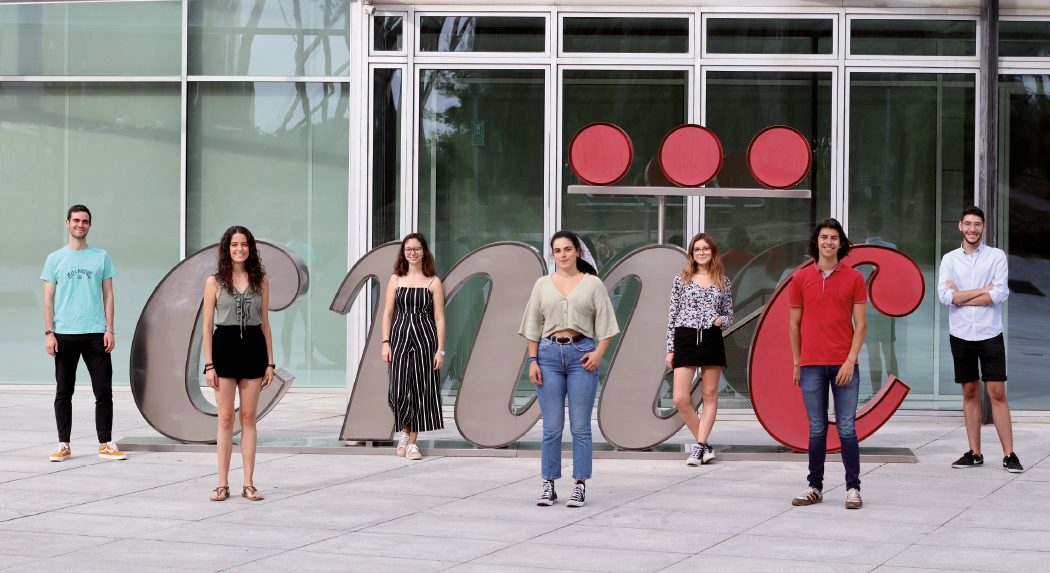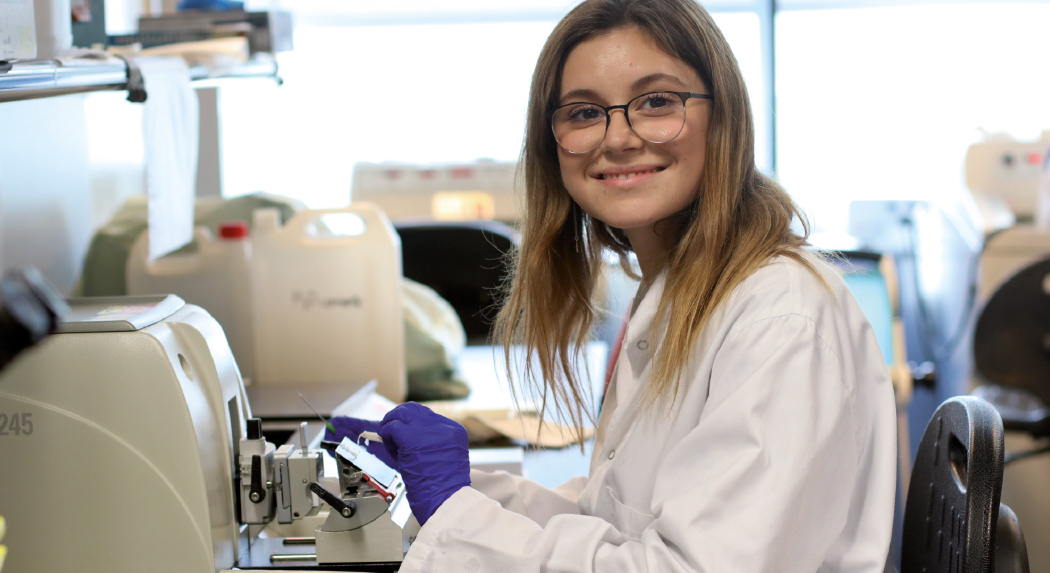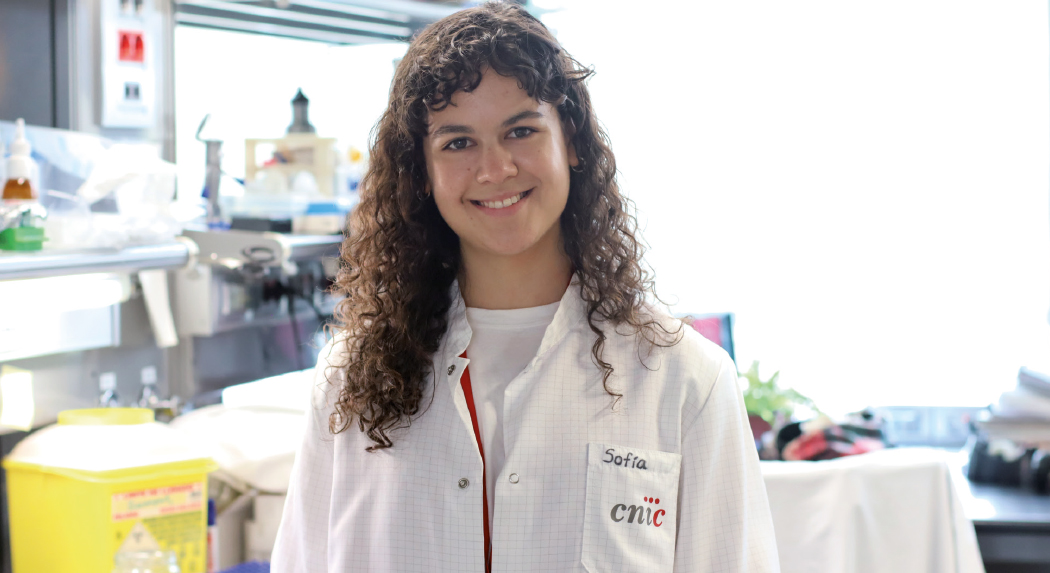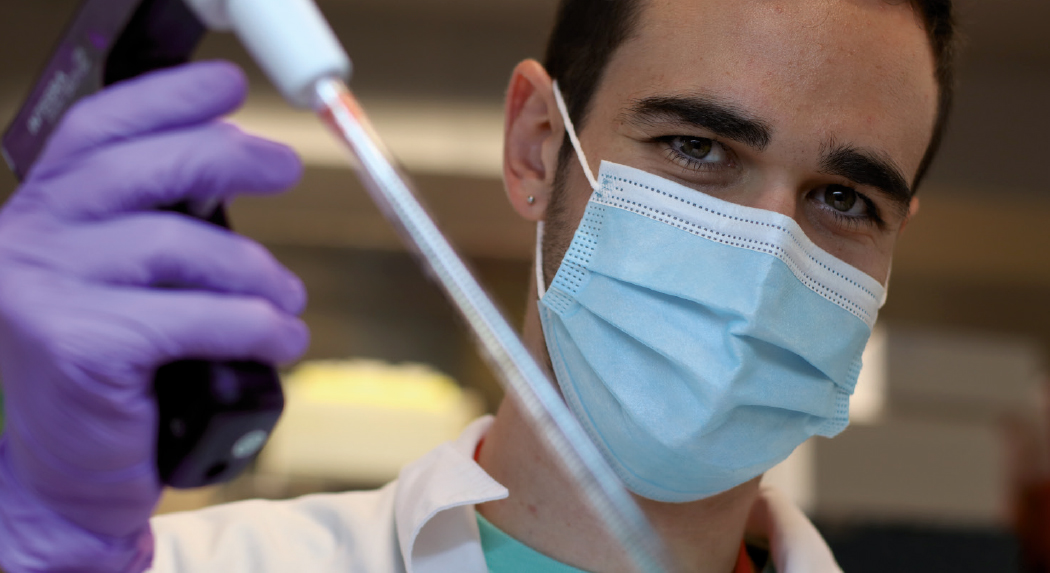Professional development & education in times of Covid-19: Acciona and the BBVA Fundación Carolina

One of CNIC’s primary objectives is professional development and education. That is why, in 2006, work began on CNIC-Joven, the comprehensive professional development and education plan covering all educational levels from secondary education to post-doctoral training and young professionals.
The plan is designed to bring biomedical research closer to young people and foster future generations of excellence among researchers in the cardiovascular field.
During 2020 and 2021, despite the pandemic, several CNIC professional development programmes continued, with the adaptations made necessary by Covid-19.
CNIC-ACCIONA Master’s Grants
One of these professional development programmes is the CNIC-Acciona Master’s Grants, created in 2008 with the aim of contributing to the improvement of human potential in cardiovascular research.
These grants offer financial assistance for students to undertake an officially recognised master’s course in biomedicine at a Spanish public university.
Each year, nine places are awarded, and despite this year’s exceptional circumstances, all of the available places have been filled.
The participants in this programme research their Master’s Final Project (“TFM” in Spanish) at a CNIC laboratory, where they have twelve months’ access to continue the work begun for their master’s and acquire further experience.
To date, 124 students have benefited from this programme, with 62% of beneficiaries staying on at CNIC to enrol in the predoctoral programme, and 42 who have already defended their doctoral thesis.
The majority of researchers who participated in the most recent round of these awards have a positive opinion both of their interaction with the CNIC groups they worked in, and of the programme itself, despite the enormous obstacles caused by the pandemic and measures to avoid transmission of Covid-19.
Carmen Morales Vidal considers that the programme “far surpassed” her expectations. “I was immersed in a group that isn’t scared to start new, risky projects and that comes up with brilliant ideas all the time. A truly enriching experience both personally and professionally.”
Inés Bravo Ruiz, who signed up to the programme without a clear idea of a subject for her master’s project, shares this opinion. “I was lucky enough to have the group leader, José Javier Fuster, as my tutor, and he guided me throughout the project and supervised all my work. The working environment is, without a doubt, unbeatable.”
Speaking of his experience in the laboratory headed by Rodrigo Fernández, Jesús Martínez Gómez highlights the opportunity it gave him to work in a multidisciplinary team covering diverse areas of knowledge. “Thanks to this, I was able to see the whole process involved in a community-based clinical trial, from visits to the centres and sample collection, to data cleansing and analysis”.
Carmen Morales, who will work on her thesis in the CNIC Genoxphos research group, expresses her gratitude for having learned to “...isolate mitochondria, work with cell cultures, use devices like the oxygraph and spectrophotometer, and design experiments, which has given me deeper knowledge of molecular techniques that will be useful in the future for my predoctoral work.”
María Dolores Serrano Martín was also happy with her experience, although she mentions that potential improvements to the professional development programme could include “...interdisciplinary skills that are useful for sciences, such as how to give a good presentation, how to write scientific articles...”

The participants in this programme research their Master’s Final Project at a CNIC laboratory, where they have twelve months’ access to continue the work begun for their master’s and acquire further experience
To date, 124 students have benefited from this programme, with 62% of beneficiaries staying on at CNIC to enrol in the predoctoral programme, and 42 who have already defended their doctoral thesis
For his part, Jorge Peña highlights having “...been able to consistently work in a laboratory, the opportunity to undertake in-depth study into the essence of science and learn to organize and structure scientific work.”
He is particularly grateful that “...from the word go, they listened to my opinion and my interests within the group’s lines of research.” He also points out that he was offered the opportunity to present his own data, problems and developments to the group, and discuss both his own ideas and those of others.
For Inés Bravo, one of the highlights was being able to work with rodents. “That was something I had never done in other laboratories, and I think it marks a considerable difference in the project’s scope; and the experience I now have of handling animals will be very useful in the future.”
And how can the programme be improved?
Carmen suggests using the university emails of all Spanish institutions to publicise the offer, helped by university lecturers who could provide information about the grants to all students who are in the final year of their degree.
Jesús indicates a substantial improvement in the programme would be a common training course for all interns or at least a structure to promote contact between them. “Being able to see and speak to people who are at the same stage as you is important,” he adds. “In my case, I already knew many of the interns, but it is true that I haven’t spoken to the rest, and have only seen them on two days.”
He also mentions that a reception or events for interns to meet each other would have been beneficial.
Marta Meireles da Silva Gil, who missed the personal contact prevented by the pandemic, highlights “...the opportunity to learn and practise many laboratory techniques with access to the highest level of services.”
Depending on the results students obtain in their master’s, and a positive evaluation of the group leader supported by the Centre’s scientific management, participants in the programme may be offered an employment contract of up to two years for further professional development in their field.

CNIC BBVA Fundación Carolina Master’s Grants
These grants are a result of collaboration between CNIC with BBVA and the Fundación Carolina, and their aim is to contribute to improving the knowledge of Portuguese and Latin American graduates in cardiovascular research. This grant programme, which began in 2017, has similar conditions to the CNIC-Acciona programme, but candidates for the BBVA Fundación Carolina master’s grants must be nationals of a country in Latin America, a member of the Ibero-American Community of Nations or Portugal, and not be resident in Spain.
As it was not possible to complete the 2020 call, the grants not given in that year were awarded in 2021, and 10 students from Argentina, Colombia, Cuba, Ecuador, Guatemala, Honduras, Mexico and Nicaragua are soon to join the programme.
Sofía Vieto Fonseca and David Mendoza Cevallos are two students who have participated in the latest edition of the programme.
David worked on his project: “The role of lipodystrophy in cardiometabolic disorders associated with Hutchinson-Gilford syndrome progeria”, supervised by Vicente Andrés, and considers that “...all of my expectations about professional development were met during the internship.” David also makes special mention of Vicente Andrés and Carla Espinós (one of the group’s researchers and co-director of his master’s dissertation) who were “always willing to help and clear up any doubts.”
Sofía holds a similar opinion: “The CNIC course not only met, but exceeded my expectations. The area of biomedicine was completely new for me, and at CNIC, I received training in different techniques and in the use of equipment I was not familiar with. In all of the departments (the animal facility, cytometry, microscopy), I found people who were always willing to help me and teach me, and at Andrés Hidalgo’s laboratory I received comprehensive scientific training that I feel privileged to have experienced.”
ofía, whose master’s project is “Defining the role of phagocytosis in cardiac homeostasis”, adds that, from the very first day, “All members of the laboratory were willing to teach me and help me at any time, and the help and mentoring that (the postdoc and second tutor for my project) Ángel gave was truly excellent. What’s more, Andrés always paid attention to my work, and met with me to guide me throughout the course of my TFM project.” Sofía is about to embark on a research fellowship at the Institute of Science and Technology Austria (IST Austria) thanks to a grant.
Since its inception, 18 students have completed their TFM at CNIC as beneficiaries of the CNIC BBVA Fundación Carolina Master’s grants. And two of the participants, after returning to their countries of origin as stipulated in the award rules, have returned to complete their doctoral thesis at CNIC.


















